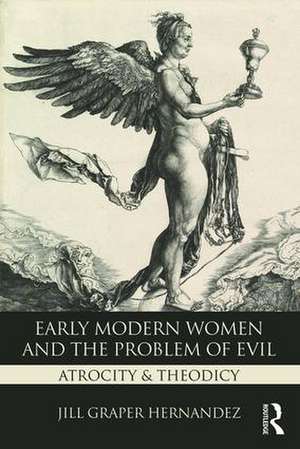Early Modern Women and the Problem of Evil: Atrocity & Theodicy
Autor Jill Graper Hernandezen Limba Engleză Paperback – 18 mai 2016
| Toate formatele și edițiile | Preț | Express |
|---|---|---|
| Paperback (1) | 360.10 lei 6-8 săpt. | |
| Taylor & Francis – 18 mai 2016 | 360.10 lei 6-8 săpt. | |
| Hardback (1) | 998.71 lei 6-8 săpt. | |
| Taylor & Francis – 10 mai 2016 | 998.71 lei 6-8 săpt. |
Preț: 360.10 lei
Nou
Puncte Express: 540
Preț estimativ în valută:
68.91€ • 71.86$ • 57.27£
68.91€ • 71.86$ • 57.27£
Carte tipărită la comandă
Livrare economică 21 martie-04 aprilie
Preluare comenzi: 021 569.72.76
Specificații
ISBN-13: 9781138122345
ISBN-10: 1138122343
Pagini: 158
Dimensiuni: 152 x 229 x 21 mm
Greutate: 0.23 kg
Ediția:1
Editura: Taylor & Francis
Colecția Routledge
Locul publicării:Oxford, United Kingdom
ISBN-10: 1138122343
Pagini: 158
Dimensiuni: 152 x 229 x 21 mm
Greutate: 0.23 kg
Ediția:1
Editura: Taylor & Francis
Colecția Routledge
Locul publicării:Oxford, United Kingdom
Public țintă
UndergraduateCuprins
1. The Atrocity Paradigm and Contemporary Theodicy. 2. Atrocity and Early Modern Women. 3. Theodicy, Narratives, and Standpoint. 4. Theodicy and Early Modern Women. 5. Challenges for Theodicy from Atrocity
Recenzii
"Bringing women’s voices from the early modern age into the theodicy/atrocity dialogue, Hernandez offers a distinct approach to exploring questions regarding evil and offers new insight that will interest students and scholars alike."
Gina Messina-Dysert, Ursuline College, USA
"Jill Hernandez provides a unique perspective on the traditional theistic problem of evil. She gives a theistic response to a modern version, the evil of atrocities, coming from a hitherto neglected source, the work of some early modern women philosophers, who focus on what Hernandez shows is essential to the atrocity paradigm, concrete harms. This book will make fascinating reading for philosophers of religion, historians of early modern philosophy and those interested in recapturing the voices of women."
Margaret Atherton, University of Wisconsin - Milwaukee, USA
"Hernandez's ambitious book first focuses on the very worst evils (atrocities) and the tangle of systemic evils in which women's lives are often caught. She then introduces us to seventeenth and eighteenth century women who use narrative to suggest ways to bring God and suffering together within the concrete contexts of their lives. The book is full of fascinating and fresh material, not to mention provocative ideas."
Marilyn McCord Adams, University of Oxford, UK
Gina Messina-Dysert, Ursuline College, USA
"Jill Hernandez provides a unique perspective on the traditional theistic problem of evil. She gives a theistic response to a modern version, the evil of atrocities, coming from a hitherto neglected source, the work of some early modern women philosophers, who focus on what Hernandez shows is essential to the atrocity paradigm, concrete harms. This book will make fascinating reading for philosophers of religion, historians of early modern philosophy and those interested in recapturing the voices of women."
Margaret Atherton, University of Wisconsin - Milwaukee, USA
"Hernandez's ambitious book first focuses on the very worst evils (atrocities) and the tangle of systemic evils in which women's lives are often caught. She then introduces us to seventeenth and eighteenth century women who use narrative to suggest ways to bring God and suffering together within the concrete contexts of their lives. The book is full of fascinating and fresh material, not to mention provocative ideas."
Marilyn McCord Adams, University of Oxford, UK
Descriere
Early Modern Women and the Problem of Evil examines the concept of theodicy—the attempt to reconcile divine perfection with the existence of evil—through the lens of early modern female scholars. This timely volume knits together the perennial problem of defining evil with current scholarly interest in women’s roles in the evolution of religious philosophy. Accessible for those without a background in philosophy or theology, Jill Graper Hernandez’s text will be of interest to upper-level undergraduates as well as graduate students and researchers.
